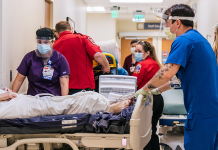The pandemic is not completely over. We have been wearing masks for more than a year while out in public. The long-awaited and long overdue experts’ guidance to cope with post-pandemic anxiety is here.
The CDC’s revised mask guidance helps Americans end home isolation. Around 155 million Americans received their shots. Hence, there is no doubt that the risk of getting infected with the COVID-19 virus is very rare.
In the past year, people have been worried about whether they have symptoms of the COVID-19 or not. It is difficult to differentiate various forms of health anxiety, says Sanam Hafeez, MD, a neuropsychologist and faculty member at Columbia University in New York City.
Earlier, there was a fear of change due to the pandemic, but now people may feel anxiety about COVID-19 vaccine efficiency.
Most Beneficial Guide to cope with Post-pandemic Anxiety
Here are some useful tips to manage post Pandemic Anxiety.
Share Your Experience
Reiss suggests that people should share their experiences with their loved ones because this will help manage anxiety.
Reiss suggests asking objective questions such as “what are the dangers?” “What is the level of risk?” and “what is a reasonable precaution?” when your fear or anxiety increases.
Anxiety is an important sign like an early alert system. People should respond to anxiety the way they would to a flashing yellow light. You should analyze the situation and proceed with proper caution. Reiss says this objective analysis helps find it like at most flashing yellows and they require reasonable precautions.
Seek Professionals
According to Reiss, you require professional help for the following reasons:
If people experience depression, anxiety, or obsessionality, interrupt normal behaviors for a longer period (this includes a few days or a few weeks).
People should not disturb vegetative functions such as sleep, eating, and concentration.
If any of these ever happened to anyone they may also be involved in any violent or dangerous impulses towards self or anybody including involvement in the abuse. In this situation, it is essential to seek professional help.
Accept the ‘New Normal’
People should give some space to themselves and understand the idea of returning to normal life, says Lori Garrott, a certified trauma therapist.
Based on her personal experience there is no post-pandemic normalcy because it was recognized as a collective traumatic event that caused numerous loss of life, she added.
These kinds of situations and events changed societies and communities throughout history. The way we live will never change exactly like before.
People should not have anxious thoughts and should not worry about returning to normal. People should focus on what makes them happy and comfortable. Normal life doesn’t have to be living like before, or the same place or following the same routine like everyone else.
If you ever find anxiety or depression gets in the way that affects your happy and comfortable life, then it will be the perfect time to consult a professional.
This is the latest guide to cope with post-pandemic anxiety and stress according to experts.


















